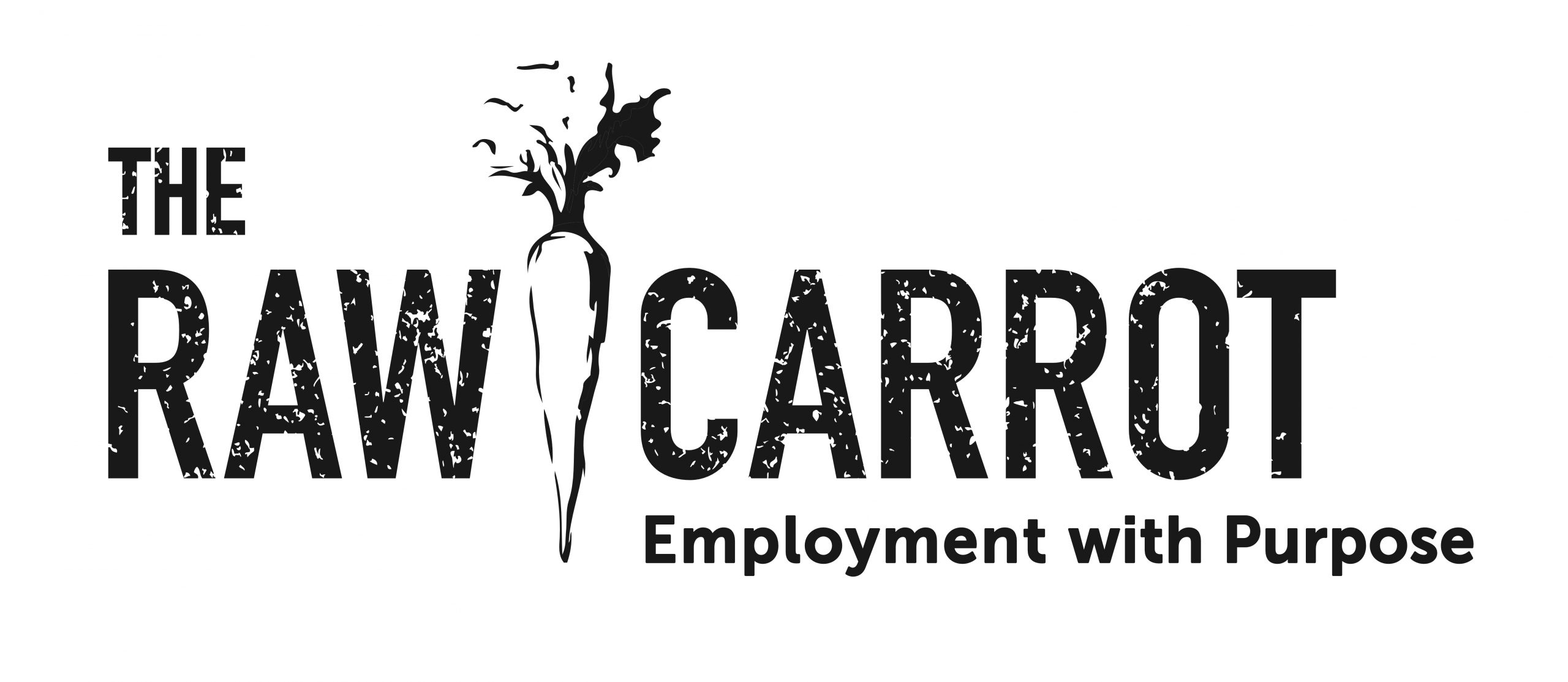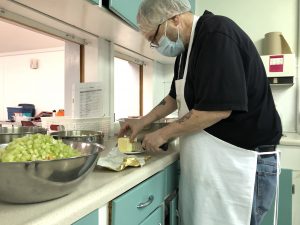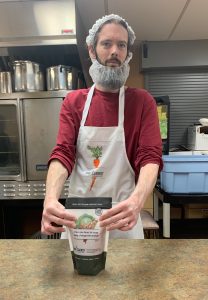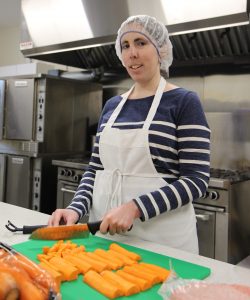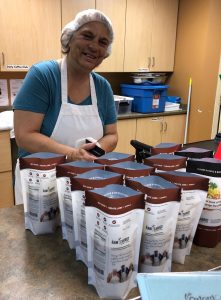STORIES FROM OUR KITCHEN STAFF
Meet Aaron
Meet Lucas
Meet Amanda
Meet Lori
Meet Ryan
Still loving it after all these years: Amanda
Nine years after The Raw Carrot first opened, Amanda talks about how work still makes her so happy. Working gives her purpose and a reason to get up in the morning. She gets to go out into the community and hang out with people she likes.
Amanda was one of the original staff hired when The Raw Carrot first opened. “It’s still pretty happy here and that’s why I’m excited to come to work,” Amanda says smiling, “It gets me out of the house and gives me a stable schedule and helps with bills, groceries, pets, etc. The only problem is I wish I could have more hours.”
Karen is Amanda’s manager at the Paris, Ontario site. She shares fondly about the transformation she’s witnessed in Amanda’s life. After a brief departure from work, she’s back in the kitchen again.
“Upon Amanda’s return to the kitchen in 2019 she lacked confidence in her ability even though she’d worked with us in the past. She was also very quiet and withdrawn. We are now seeing the true Amanda: happy, funny, confident, great laugh,” says Karen. “She is training to take over the cooking of the soups should we need her and she’s doing really well.”
Amanda goes on about how much she enjoys working, “I like working a lot. I like doing things with people and I’m always excited to come to The Raw Carrot and joke around with my friends,” she says.
Before The Raw Carrot was launched, there were a number of people like Amanda at the church—people who were marginalized because of disability or mental health challenges, some accessing the church’s benevolent fund to make ends meet. While they had the potential and expressed a desire to work, they faced multiple employment barriers in the traditional workplace. Moved with compassion, Rebecca and Colleen (The Raw Carrot Co-Founders) created a social enterprise out of the church kitchen to fill the employment gaps for people like Amanda.
Amanda says that before she worked at The Raw Carrot, “I felt kind of stupid and that I was a bump on a log. It’s a very fun place to be, everyone makes you feel welcome.”
Amanda moved away for a few years and wasn’t able to work at The Raw Carrot. She recalls how much she missed working here during that time. She really disliked her other job and was so thrilled to return to town and get her old position back, “I definitely felt the difference when I came back and my life changed for the better.”
Karen proudly talks about Amanda’s future, “We’ve just started talking about what jobs she might like outside of The Raw Carrot; looking to more traditional employment. Amanda is always willing and ready to help out with shows, sales, whatever we need. She’s a hard-working, dependable and loyal.”
Working at The Raw Carrot changed the course of Amanda’s life. She said, it’s hard for people with disabilities to get jobs because they often experience discrimination. “The Raw Carrot gives people with disabilities a chance—people who are just like anyone else—just a little different,” Amanda confidently says, “Different is good.”
Meet Wyatt
Wyatt was born with Chronic recurrent multifocal osteomyelitis (CRMO) which is low muscle tone. He struggles with ordinary day-to-day tasks due to the pain and inflammation that comes with his disability. Due to low muscle tone (CRMO), his mental health has been negatively impacted but to help overcome his mental health challenges, Wyatt makes unboxing content, writes music, and live streams. He is a lover of all things Pokémon and Funko Pop. Wyatt’s ultimate dream is to open up his own studio for people to write and record music.
Around the age of 12-13, Wyatt’s collarbone had shifted sides and proceeded to worsen, causing harsh flare ups in his arm, wrist, neck, and head. This caused his range of motion to be severely limited which left him with no other choice than to quit his job. Due to the severity of the pain, he was stuck in bed and unable to work for months after that.
Despite Wyatt’s disAbility, he never gave up on trying to find employment that was right for him. He started working at The Raw Carrot in September of 2021. In the past, he has found employment but they all required physical labor that he was physically unable to do, despite having the willingness to do it. Getting a job at The Raw Carrot has had such a meaningful impact in his life, “I finally got a job and I just kept going…The Raw Carrot has been beneficial because I made friends, I got my foot in the door, and it got me out of the house.”
When asked why it would be meaningful to see The Raw Carrot grow? Wyatt stated, “Buy soup, create more jobs. When you buy soup, the money goes to the resources to create more jobs and when you have more jobs than you have more people who can come in and help grow the organization. The more that you buy the soup the more you help with the resources to create more opportunities for people who are on disability.”
Wyatt would like to share the following with our donors and those who buy our soup. “Help others by creating more jobs, that’s what people need. Everyone deserves a chance. I’m going to use a baseball analogy, if you strike out 3 times then you’re out but why not if you have that third strike and you get a home run. That home run could lead to anything.”
The Gay Lea Foundation helped create the opportunity, Terry chose to thrive
Disability and mental illness can strike at any point in a person’s life. It can be debilitating when it occurs, but it doesn’t have to be when a community steps in to provide employment and support. For Terry, working a job at The Raw Carrot helped him provide for himself and take the necessary steps toward recovery.
“I had a normal life – work, family, kids — until suddenly things changed. I started not feeling well, and I was tired all the time. I was unable to work. I reached out for help and went to see a psychiatrist. I was initially diagnosed with depression,” says Terry.
The Raw Carrot is a social franchise that believes that every person who WANTS to work should have the opportunity for a hand-up instead of just a handout in life. The organization partners with churches and nonprofits across Ontario to create meaningful employment for amazingly talented individuals living with disAbilities and mental illness. They’re making a difference in local communities through their delicious, handcrafted, gourmet soup!
“Unfortunately, the anti-depressants I was prescribed started changing my thinking patterns,” says Terry. “I started getting suicidal, I was sad all the time, and I lost interest in everything. I attempted to take my life and was unconscious for 3 days on a respirator, thank God it didn’t work out. I was in a psychiatric hospital for 8 months and my family fell apart. When I was released, and unable to work, I was able to get onto ODSP (Ontario Disability Support Program) so that I could afford to live.”
Across The Organization for Economic Cooperation and Development (OEDC) countries, people with disabilities and mental illness experience employment rates that are 40 percent lower than the overall average and double the average unemployment rate. Research consistently finds that people with disabilities work less, earn less, and earn lower wages when they do work. Their employment disadvantages include (among others) fewer hours and lower wages. People with disabilities and mental illness are far more likely to experience poverty and have lower levels of household income, and most of this vulnerability is due to low employment rates.
The Gay Lea Foundation is committed to supporting Canadian charities that work toward the relief of poverty, advancement of education and purposes beneficial to communities in Canada and around the world. With the support of a $9,000 grant from the Gay Lea Foundation last fall, The Raw Carrot has been looking into more ways to help people like Terry earn more income. They’re developing new products with more profit margin and pursuing the testing and development of shelf-stable products, product packaging, a go-to-market plan, and a campaign strategy to increase visibility and product sales that will result in increased hours and job creation for individuals living with disAbilities and mental illness in local communities in Ontario.
To read the full story, visit Meet Terry: The Gay Lea Foundation helped create the opportunity, Terry chose to thrive | Gay Lea
A Transformation Story: Russell’s safe place
As we sat down to talk about Russell’s job at The Raw Carrot in Kitchener, his co-worker friend Nick shouted and waved goodbye, “Hey Russell, see ya later! Nice working today!”
“Nick’s my friend,” Russell says “And Leah’s my friend too, she’s the kitchen manager. It’s a safe place here for you to make friends. I just love being here. Being here helps me stay focused on my daily routines.”
Russell likes working at The Raw Carrot, “I love the soup too and I eat it a lot!” His two favorite Raw Carrot soups are Loaded Potato Bacon and Mulligatawny. He often brings soup back to his “other family” at the group home where he lives after his shifts.
“I eat the soup all the time with other people in the home and they like to eat it with me,” says Russell, “I like working here.”
Russell was born with Down Syndrome and has been working at The Raw Carrot since 2018. He feels comfortable here. He’s content with his current schedule, “It’s okay. I have enough.”
Social work intern learns a valuable lesson
Linda Dragusha is a Raw Carrot intern and social work student. She has learned a lot from The Raw Carrot staff. When she first started the internship, Russell didn’t interact with her. “But that did not stop me from breaking down that wall, I asked the manager Leah what Russell enjoyed talking about so I could build a relationship with him,” she says. They bonded over music and sports. “We were both singing along to the pop song Roar (Katy Perry) and now we always chat with each other.”
Dragusha shares more about the internship, “Every day when I come into Raw Carrot, I see a positive environment, a safe space for staff to be themselves, build friendships, get support, and work with their disability.”
After getting to know the staff on a one-on-one basis, or in group discussions, a bond of friendship was built.
“The work environment at The Raw Carrot is inclusive and welcoming to all its staff and volunteers,” she continues, “Over the last few months, I have been able to learn and develop my community-based skills with the help of Leah and The Raw Carrot staff—and I see the difference an organization like The Raw Carrot can make in a community.”
World Down Syndrome Day
In March, The Raw Carrot celebrated World Down Syndrome Day. Russell suggested the staff celebrate with a pizza party. His favorite pizza is the meat lovers’ pizza. Now, Russell thinks we should highlight all special days, “We should celebrate all of them because everyone has different abilities.”
Growth in Confidence and Consistency: Darrel
Darrel believes everyone is meant to work whatever their capacity rather than just sitting around waiting for a cheque from the government. That’s why he believes it’s important that we find ways to provide jobs for people with disabilities and mental illness.
Darryl, 35, sustained life-altering injuries in an accident back in 2004. Having broken multiples bones throughout his body, he suffered from debilitating chronic pain. He used to work with his father installing geothermal systems in houses.
“I didn’t get out much for over 10 years, it was a lack of interaction with people for years. I didn’t leave the house much,” he says.
In 2012, he developed yet another physical ailment that caused constant nausea and he couldn’t do anything. It turns out he had an untreated kidney infection that required hospitalization. With treatment he returned home and started to think about possibly finding a job one day.
In the last 10 years working with a case worker, Darrel doesn’t recall any suggestion he could look for a job. “It was more like here’s a cheque that’s never enough for every month and you can barely get by on.” In fact, Darrel says, “Last fall, I was going to call my case worker to see if they could point me to anything, at least part-time until I could get in better shape physically to work more again.”
That’s when Darrel’s mother heard that The Raw Carrot was hiring and that it provided jobs for people with disabilities and mental illness in a supportive work environment. It had been a long and slow rehabilitation process since Darrel was injured. In reviewing the job description, he felt hope that he could actually do the work so he applied, got an interview, and then was thrilled to land the job.
“I actually feel great most of the time now,” Darrel says with hope in his voice, “I look forward to working every week, I just wish I had more shifts—specifically more days a week. I like the people, I like the job and doing something productive. It gives me a sense of normalcy to be working again.”
Darrel thinks there’s a lot of discrimination towards people with disabilities and mental illness and a false belief that they don’t really want to work—that they’re fine with just sitting around and getting a cheque handed to them.
“Working at The Raw Carrot is actually allowing people to earn money. Because humans aren’t meant to sit around and do nothing. We seem to actually get a lot of satisfaction out of creating or doing something or earning, rather than just having things handed to you because it kills your self-worth.”
Darrel reflects on his fellow kitchen staffers, “I see a lot of people who seemed to have been in similar situations to mine and they get here and they actually have a good time, and enjoy being here,” he says, “When you’ve not been working for so long, or disabled, or struggling, to actually be here and enjoy it seems quite valuable to everyone I see, including myself.”
Darrel’s parents have been very understanding about his situation over the years, but they were worried about his future and how he would be able to support himself. “They’re both happy that things are very obviously going in the right direction now. It’s clear to see that the stagnation is no longer there, and I’m moving forward again now.”
Now that Darrel is regaining his strength back, he hopes to do some of the geothermal work again, but he’ll keep his work at The Raw Carrot. “I’d like to continue to do both.”
Amberly MacLachlan is the kitchen manager at the Innerkip Raw Carrot site. “I would say I have witnessed growth for Darrel in both confidence and consistency.”
A Story of Acceptance and Belonging: Allison
Allison will be celebrating her five-year anniversary at The Raw Carrot in May. She speaks fondly about the family dynamic here. She sees her co-workers and Leah, the site’s kitchen manager, as family. She can talk to them about whatever is going on in her life.
“It’s a place where you can go to be accepted and treated equally,” she says.
What Allison appreciates is that her manager Leah knows she’s capable. She likes to prepare the mixed vegetables, “It’s calming. Leah lets me go at my own pace. There’s no end time. No pressure. The job is done when the soup is done.”
Before her job at The Raw Carrot, Allison worked at seasonal jobs at a Halloween store and Party City. That was challenging for her so she worked with a job coach to find something more consistent and permanent. When the job became available at The Raw Carrot, she hoped she’d finally found the stability she was looking for.
The Raw Carrot understands that for people with disabilities and mental illness, jobs are often seasonal and unstable. That’s why we are committed to offering permanent, part-time work to our staff. That way they have something stable and consistent they can rely on.
When asked how more funding would help The Raw Carrot, Allison pauses and thinks, “If people give more funds to the Raw Carrot, it will help her and the others stay employed. It would also help us buy more fresh ingredients.”
Allison is happy that she has a job. “I learned new skills at the Raw Carrot over the years. I have been able to learn when I am comfortable interacting with others and when I need my down time.”
Allison is eager to send out a message: “We (people who experience disabilities and mental illness) want to work and are capable to work.” She hesitates, then continues, “We’re happiest when we get into a routine—a job is pretty important because it gives you money and helps with bills so you can share responsibility,” she concludes.
She heard about the job on Indeed and her job coach helped her apply. At the time of the interview, she shared openly about her diagnosis but cautions that she isn’t necessarily wanting to tell everyone about her challenges.
On a lighter note, Allison becomes animated when she talks about her love of reading fantasy novels. After helping her mom pay the cable and utility bills, and her bus fare, she loves to buy books with the money she takes home from The Raw Carrot.
Allison reluctantly adds, “My only complaint is that I’d like more hours and if Leah ever asks me to work a double shift, I say ‘YES!’”
Growing in self-confidence and self-esteem: Monica
Monica has been working at The Raw Carrot Innerkip site since August 2019 when it first started and she hasn’t had a bad day of work ever since.
“I love it! I love the people, I love the atmosphere, it builds my confidence and self-esteem. It’s really rewarding,” Monica says, “It’s a great group of people to work with.”
Monica laughs quietly as she shares that it’s the only job where you can cry and laugh at the same time. She’s referring to all the onions they have to chop to make the soup. “We never go through a day of work without laughing.”
Now 60, Monica recalls how life was before working at The Raw Carrot, “Before I mostly stayed secluded. I didn’t socialize much. Now I come here and socialize and I’m more confident. I just feel so much better about myself.”
Monica shares how difficult it is for someone like her, with PTSD (post-traumatic stress disorder) and fibromyalgia, to find suitable employment that takes into consideration her challenges. She thrives in a supportive work environment that accommodates her need for a low-stress and encouraging environment.
“I’ve worked a lot of jobs in my life. I worked in the military, as a counselor’s assistant for a retraining program for people on welfare, I worked as a teacher’s assistant, but this is my favorite job in a long time,” Monica says, “I’m satisfied here.”
Why should donors give?
Monica believes donors should support The Raw Carrot so more people like her can benefit from work that provides income, community, and self-esteem.
“Because it does tremendous things for people’s self-esteem and when you’re on a low income you don’t have many things that you can do, especially if you’re on disability. It’s done amazing things for my morale.”
What’s more she says, “You get to contribute towards your own welfare.”
